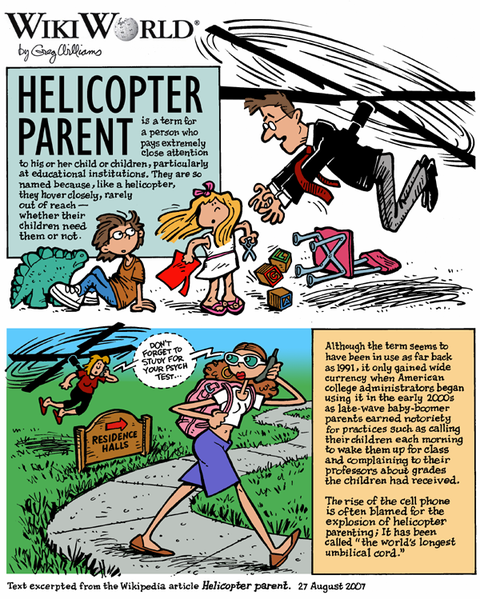Helicopter parents
The Universities claim they are facing the growing phenomenon of “helicopter parents” – the over-involved parents who want to continue interfering in the lives of their children at university.
The following item is an extract from the BBC on-line news. The full text is available at ‘Pushy parents can act as agents’. Read the article and decide where you stand. Add your own comment to the article.
‘Infantilism’
The university admissions service, Ucas, says that in response to the number of calls from parents that it has decided to allow parents to act as their children’s representatives in handling applications.
As such, young people making applications this year have been allowed to nominate a proxy to speak for them and make decisions.
“This is usually because the parent feels they haven’t got all the information they need from their son or daughter and so phone back to double check and clarify points,” says a Ucas spokesman.
About one in 10 students this year are estimated to have used this option of nominating their parents to make calls on their behalf.
Frank Furedi, social commentator and professor of sociology at the University of Kent, says that controlling parents are “destroying the distinction between school and higher education”.
“All universities now have to take the parent factor into account. On university open days you can see more parents attending than children,” says Professor Furedi.
He says there have been cases of parents who arrive expecting to attend their children’s university interviews.
Professor Furedi says that he tells parents that they have to leave, but there are other academics who “accept that this will be a family discussion”.
“There is a powerful sense of infantilism, where parents can’t let go.”
Consumerism
This extends to universities having to handle complaints from parents over grades awarded to students, he says, and a constant over-involvement during term time.
“We have to remind parents that there is a professional relationship between academics and students,” he says.
Professor Furedi expects this parental pressure to grow – with the risk of turning universities into “schools for biologically mature children”.
He warns that it will follow the trend in the United States for universities to pitch their marketing at parents rather than students.
Rob Evans, head of admissions at Sussex University, says that universities are seeing an increasing amount of involvement from parents when students are making applications.
He links it to the increased cost of university and also to a more over-protective form of parenting. Safety fears mean that children can grow up with less independence, such as not being allowed to walk to school, and this attitude filters through to when young people apply to university.
The high-pressure parent is a reflection of consumerist values hitting higher education, says Cary Cooper, professor of organisational psychology at Lancaster University Management School.
“These parents are paying more, so they think they can demand more,” says Professor Cooper. Parents want to retain control of their “psychological and financial investment in their children”.
Parents are also using their children as surrogates for their own ambitions, he says, getting them to chase the success that they might feel eluded them in their own careers.
“Parents derive status from their children’s success,” says Professor Cooper.
Points of view
Listen to the following points of view and add your own.

